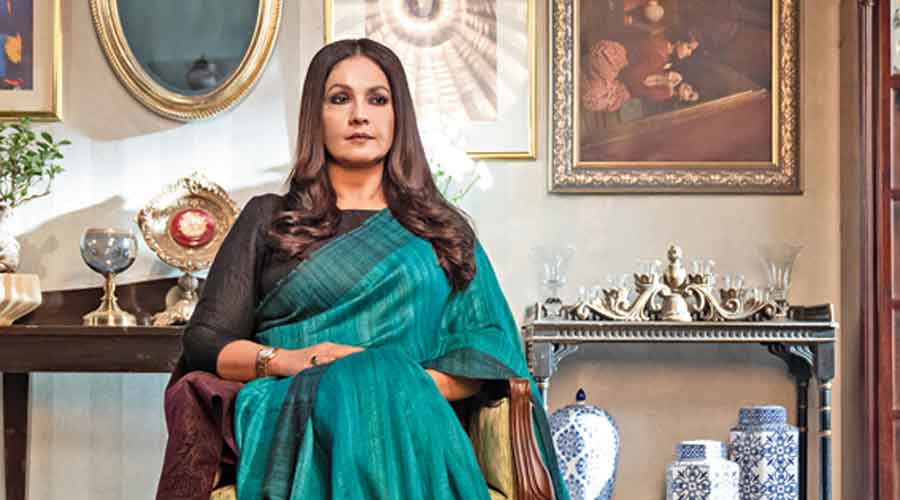Pride and prejudice, ambition and authenticity, boredom and betrayal, tenacity and truth define the lives of the five women who inhabit the world of Bombay Begums. The six-part Netflix series created by Alankrita Shrivastava — the maker of gender-bending films like Lipstick Under My Burkha and Dolly Kitty Aur Woh Chamakte Sitare — covers a spectrum of women, from age 13 to 49, led by Pooja Bhatt’s Rani Singh Irani. Shahana Goswami as Fatima Warsi, Amruta Subhash as Lakshmi aka Lily, Plabita Borthakur as Ayesha Agarwal and Aadhya Anand as Shai Irani represent the roller-coaster ride that every woman’s life represents.
Over a Zoom call, The Telegraph engaged in a freewheeling conversation with Alankrita, Pooja, Shahana, Amruta and Aadhya on the world of Bombay Begums, that streams today, and more.
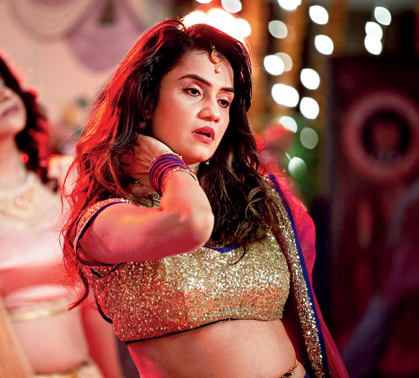
'Yesterday, I was telling someone that content is the queen of this show. Being able to work with Alankrita was my biggest trigger... I badly wanted to work with her. And then life offers me the role of Lily, which is a totally new space for me. Lily’s dancing and Lily’s ‘Lily-ness’ was the trigger for me to do this show' Amruta Subhash as Lily
Alankrita, you excel at exploring the inner worlds of women. What was the trigger point for Bombay Begums?
Alankrita Shrivastava: I had this idea long back... I think it was 2012 or 2013.
I was very fascinated with what was going on with many young urban working women... the fact that they had dual responsibilities, they are breadwinners and they also have struggles at home. Since the economy opened up in India, many more women joined the work force. My mother is from IIM Ahmedabad and in her batch, there were only four women among 80 students. She told me that most of these women didn’t end up pursuing a full-time corporate career, while all the men went on to head companies. I just kept thinking about that.
But if we also look at it, India has had a lot of women gaining great success in the banking industry. That just got me thinking about working women and what it means. Bombay Begums primarily explores ambition in women. I also wanted some sense of intersectionality, which is why there is Lily’s (played by Amruta Subhash) character (who is a dancer and prostitute). And I also wanted an age graph. I am saying all of this in retrospect, but at that time, it was all very organic.
I have lived with this idea for many, many years. Initially, I thought it would be a TV show with some 100 episodes (laughs). I had kind of forgotten about it until it came up at a meeting with Chernin (Entertainment) in LA and they said, ‘Why don’t we do something together?’ And I was like, ‘I don’t have anything’. My agent was with me and he said, ‘But what about that show that you have?’ And that’s how it started.
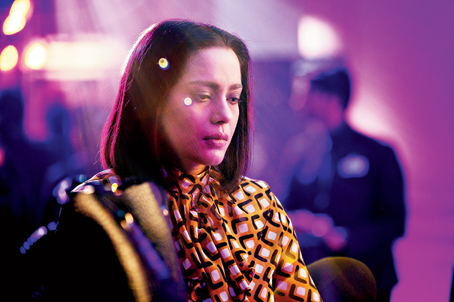
I call Bombay Begums the new-age slice of life where ‘slice of life’ is not easy and fun and frolicky, but slice of life means you have all the flavours... it’s the umami, which has the bitter, the sweet, the sour... it’s the balance that brings a holistic flavour to something. For me, it was that... it’s ostensibly a show about women but not in the way people imagine a women’s show to be' Shahana Goswami as Fatima
For each of the actors, was there a specific aspect of your extremely powerful and varied characters that made you say, ‘Yes, I want to play this woman...’
Pooja Bhatt: For me, it was the privilege of being able to play my age, and to be able to deal with a taboo topic like menopause. At the same time, she (Pooja plays a banking head honcho) is a woman who follows her heart, has sexual impulses and is unafraid to go out there and gratify herself. After a point of time, especially in the commercial frame of film-making, you evolve from being cast opposite someone to going on to play their mother. Life is very kind to men and even with age, we tend to give them a far longer rope than we give women. We don’t want women to exhibit the passage of time because somewhere I think that our memories and our adolescence are kind of tied to that. And when you see your first crush or teen icon age, your memories age and you have to accept the fact that you have aged too, and that’s not very comfortable.
It’s a great script, a compelling part and a fascinating world, and I loved the title. I had loved Alankrita’s Lipstick (Under My Burkha) and I found the grammar of this show to be very different. It just says so much without being in your face, and I feel a lot more gets communicated when you don’t really need to scream your truths. Rani is not like me in many ways. And yet, the last 21 years of not being in front of the camera, garnering different life experiences and of being a ‘lady boss’, in terms of starting my own production company at a time when it was not something that a commercial actor was even meant to dream of, but I still went ahead and did it and faced many biases... I could relate that aspect of my life with Rani’s.
But the way she approaches things, the way she shields herself from the world and tucks her vulnerabilities away is not really me. But that was the joy. The fact is that you catch these women at different parts and times of their lives, and to have such diversity in casting... we aren’t the same type of women at all. It’s such a pleasure to be able to see that because most of the time we only want one colour, we want everything to be painted with the same brush... we want women to look a certain way if they are this age or that age. This show really breaks down all those cliches. It’s a great, great part. Life was banging on my door and I would have been a damn fool to not fling that door open and say, ‘Hello, I am ready to be swept away with you’.
Shahana Goswami: I am always fascinated by characters who are either not over-glorified or vilified. I am tired of hearing this phrase ‘grey characters’... they are real, let’s just progress into losing this title of ‘grey’. I find it very fascinating when you watch the journey of a character and you aren’t sure what you feel about them... because that’s life! When you come across people, you don’t really know whether you like them or you don’t. We don’t consistently like someone or consistently dislike them.
I call Bombay Begums the new-age slice of life where ‘slice of life’ is not easy and fun and frolicky, but slice of life means you have all the flavours... it’s the umami, which has the bitter, the sweet, the sour... it’s the balance that brings a holistic flavour to something. For me, it was that... it’s ostensibly a show about women but not in the way people imagine a women’s show to be. It’s not like, ‘Oh we are all championing each other, oh we are all best friends!’ No! It’s also about women understanding their relationships with each other, with themselves, with the men around them....
What fascinated me about the script is that it had an element of authenticity... to character, to life, to the experiences of being a human being, which is so beautifully depicted without it being banal but also not over-emphasised in a way that feels dramatic. And yet it touches upon things that are so pertinent and so sensitive. It comes from a real space, with Alankrita having experienced and observed life. It goes from a spectrum of a girl (Shai, played by Aadhya Anand) who is 13 to Rani who is 49. It’s a huge spectrum and it just comes from being honest to your experiences about life. And not often do we see that translated with that honesty and that authenticity in a narrative, in the characters, in their journeys, in their likability and dislikability....
Pooja: I must also add that all the men in the lives of the women in Bombay Begums are not caricatures, they are not the ones who are holding us back, they are not the ones who have locked us in these gilded cages. It is us who hold the key, and we realise at the end of it that the door was always locked from the inside. I think that’s true for all of our characters on the show.
Amruta Subhash: For me, it always has been content. Yesterday, I was telling someone that content is the queen of this show (laughs). Being able to work with Alankrita was my biggest trigger... I had seen Lipstick and Dolly Kitty (Aur Woh Chamakte Sitare) and I badly wanted to work with her. And then life offers me the role of Lily, which is a totally new space for me. Lily’s dancing and Lily’s ‘Lily-ness’ (laughs) was the trigger for me to do this show.
Aadhya Anand: What fascinated me about Shai is that she’s not every teenager. She’s on the journey of figuring out her life. In that journey, she makes a lot of bad decisions, but she also discovers herself during that process. She’s wise for her age and there’s this moment where she says, ‘There’s an old woman trapped in a young girl’s body’. Shai is the narrator of the series and there’s a certain relatability with her.
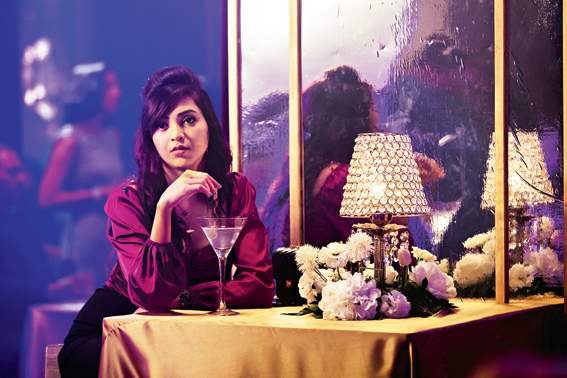
Plabita Borthakur as Ayesha
Alankrita, why did you set this story in Bombay? Aren’t the struggles of women everywhere the same?
Alankrita: I totally agree with you, I definitely think they do. In fact, I feel that Bombay is probably the best place for women in India to work and live. I have spent a lot of time in Delhi and the day I moved to Bombay, I knew I couldn’t go back to Delhi because just the feeling of being able to walk on the road without having people cat-calling you and trying to feel you up, is so liberating.
The reason it’s set in Bombay is that it’s the financial hub of the country. The banking sector is pretty much headquartered in the city. Bombay is also a place where a lot of women live without their families. So it lent itself nicely to that. In many senses, it represents this dream where a lot of women live on their own.
Also, the bar dancing culture is set in Bombay. So the decision was very instinctive and natural, we really didn’t think of setting it anywhere else. The moment I had this idea I knew it was going to be set in Bombay. And this homelessness thing (that is faced by Ayesha Agarwal, played by Plabita Borthakur) is a very Bombay thing. It’s happened to me a lot... figuring out where to live, getting thrown out of homes and all of that! (Laughs) I also feel that it’s a city, more than any other city in India, that really enables women to have their own space.
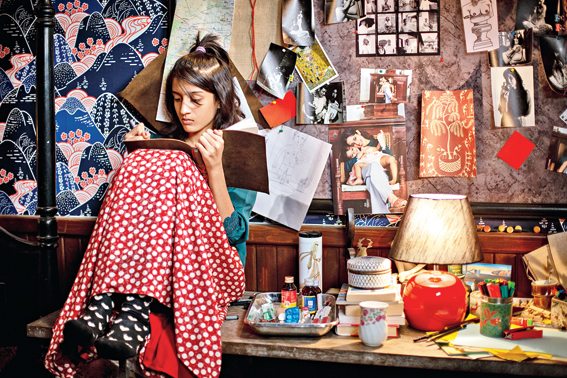
What fascinated me about Shai is that she’s not every teenager. She’s on the journey of figuring out her life. She’s wise for her age and there’s this moment where she says, ‘There’s an old woman trapped in a young girl’s body’ Aadhya Anand as Shai
The women in Bombay Begums face prejudice but are also guilty of perpetuating prejudice towards others and towards themselves. Is that something that has happened in your own lives?
Alankrita: I definitely have. I truly feel that we often limit ourselves as human beings because we have been conditioned into thinking that this is all that we deserve. I feel I am constantly battling my prejudices about myself and what I can do and can’t do. We are conditioned to think that a woman can only do so much.
Shahana: It’s true for me too. Right now, I am going through a phase of questioning myself a lot. I realise that guilt is a huge problem for me. Guilt in terms of not doing enough, not being good enough... I have had major struggles with liking myself, yet knowing that the world sees me as a very confident person, from the time I was a kid. I was always very popular and so there was no reason for me to not like myself. I have always been aware that I am the one coming in my own way, in some sense. But where it comes from and why, I don’t know. It’s very deep-rooted, it comes from generations of conditioning, and there’s this constant feeling that whatever you are doing is not good enough. You are not being considerate enough or kind enough, maybe you are being too selfish or too arrogant.... Maybe none of it is happening, but there is a constant need to keep a check on yourself.
I don’t think these things are very gender specific because I wasn’t brought up in a way where I was treated differently. But it seeps in through various factors and I am still struggling. I keep finding ways of letting go of those prejudices towards myself, and sometimes towards other people as well. To be honest, our hatred or judgment of anything external is just a reflection of what we feel about ourselves.
Amruta: Sometimes we are not even aware of it. When I saw Lipstick, many of the characters taught me about my own prejudices. In Bombay Begums, Fatima’s track is an eye-opener for me as a person. Most of the time you feel vulnerable, under-confident and even hateful towards yourself, but you don’t even know where it’s coming from. I sometimes tell Alankrita, ‘Thank you for writing this, thank you for stating this on screen’. That helps me understand myself, and that’s something Bombay Begums did for me.
Pooja: I faced a lot of prejudice. I was a regular 17-year-old who had impulses and an open relationship with my parents who knew if I had a boyfriend or not. And I was told, ‘Pooja Bhatt, if you want to make it in this industry, learn to keep your opinions to yourself’. The example of an actor and a woman I have great admiration for, Tanuja, was given to me and I was told she’s a wonderful actor but she never really got her due because she had opinions. But I still followed my heart. At 19, I had a kind of rebellious streak. And now at 49, you are okay with people not liking you (laughs). You are not desperate for either acknowledgement or liking. So I think the passage of time also teaches you a lot. But there is some need in all of us to live up to some kind of ideal that we all have....
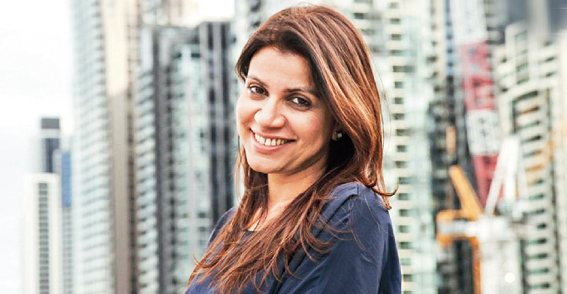
I had this idea long back... I think it was 2012 or 2013. I was very fascinated with what was going on with many young urban working women... the fact that they had dual responsibilities, they are breadwinners and they also have struggles at home. I have lived with this idea for many, many years. Initially, I thought it would be a TV show with some 100 episodes — ALANKRITA SHRIVASTAVA
There is an interesting line in the show where Pooja’s Rani says, ‘They are waiting for us to fail’. As women, do you constantly have to look over your shoulder with the feeling that people are waiting for you to fail?
Pooja: Constantly! It’s never the outside world, it’s your very own. Let me talk about something as close to my heart and something as life-altering as my acceptance of the fact that I had an addiction issue with alcohol. When I decided to chuck the bottle, it was random strangers who egged me on and actually believed in my journey far more than my very own friends. Some of my own family actually wanted me to fail because my giving up the booze was a reminder that they perhaps couldn’t give it up themselves.
I have had a situation where I called up my regular wine dealer — who I had been going to for the last 10 years — to order a bottle of wine for a friend after I had given it up, and I could gauge the fear in his voice when he asked me, ‘Ma’am, kiske liye hain? Aapke liye?’ And I am like, ‘Mere liye nahin hain yaar, maine chhod di’. And he says, ‘Haan maine padha tha, lekin ek second ke liye dil ghabra gaya’. That moved me so much. Here is a man who actually trades in alcohol and he was rooting for me to continue to stay on my path of sobriety when actually my going back to drinking would have been very beneficial to him financially. On the other hand, I have friends who have said, ‘It’s our anniversary. Come on Pooja, ek drink hamare liye’, without understanding what it took for me to say ‘no’. It reminds you that the kindness of strangers is what we should be open to, and sometimes the silence and the apathy of your friends is something that hurts far more.
Shahana: We are mostly used to the idea of people expecting you to fail. But there is also a pressure in people wanting you to succeed in the way they want you to succeed. This show tells you that you have to figure out what it is that you want, and be true to that. Don’t judge yourself for it and don’t let other people define that for you. Ambition is not just about being successful at work. Your ambition could be that you want to be an amazing painter but never sell a piece of your work, but just do it for yourself.
Pooja: I think all of us at some point of time have been told that we aren’t ambitious enough. I have been told, ‘Oh, you could have done so much with your life and career’. And I am like, ‘Oh really?! I have survived this business for 30 years with my soul intact’. That’s a lot more than what most people have done. The films fade and the golden jubilee trophies get tarnished but your soul is what you carry with you. And I think, for me, that’s really more important.

